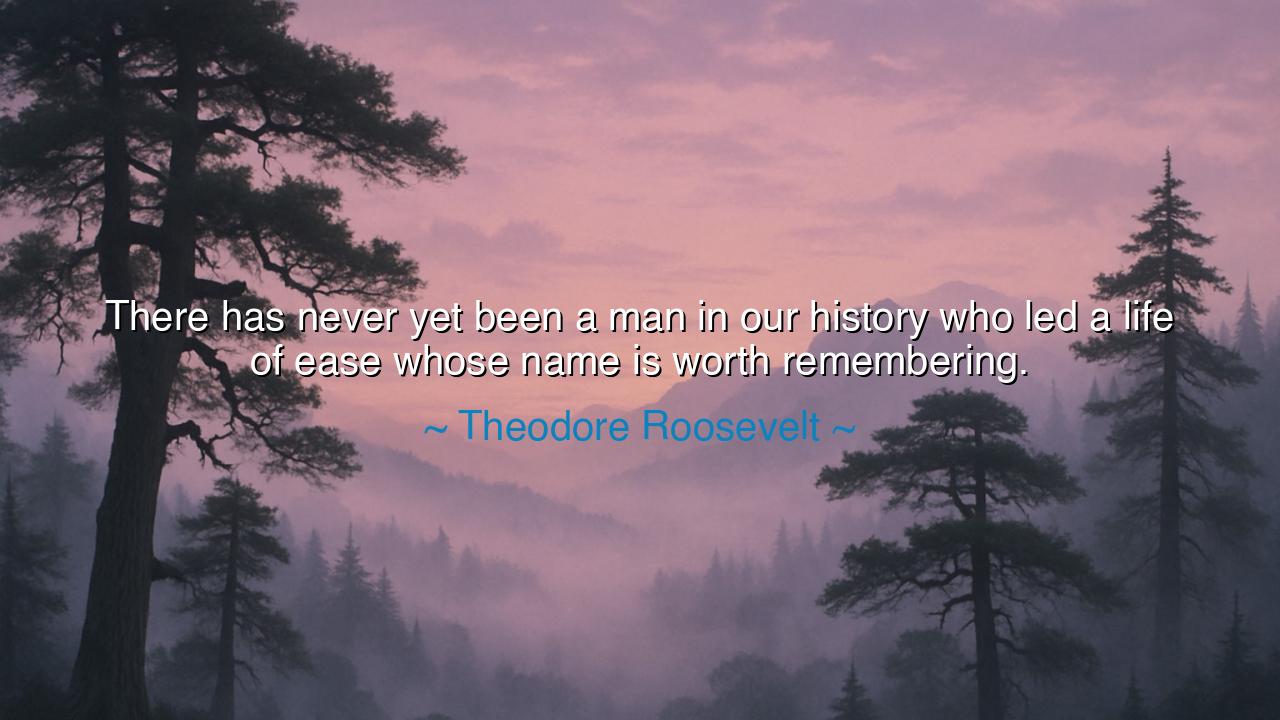
There has never yet been a man in our history who led a life of
There has never yet been a man in our history who led a life of ease whose name is worth remembering.






“There has never yet been a man in our history who led a life of ease whose name is worth remembering.” — Theodore Roosevelt
Listen well, O children of toil and dream, to the thunderous wisdom of Theodore Roosevelt, the Rough Rider, the reformer, the president who wrestled both men and fate with equal fervor. In this mighty declaration, he speaks not as a ruler of a nation but as a master of spirit, reminding us that greatness is never born in comfort. He proclaims that ease is the enemy of endurance, and that history remembers not the idle, but the strivers, the builders, the fighters — those who have faced adversity and refused to yield. His words strike like hammer on anvil, shaping the soul of all who hear them into something stronger, truer, and more alive.
The origin of this saying lies in Roosevelt’s own life, which was a living testament to struggle transformed into strength. Born frail and sickly, with lungs that could scarcely draw breath, he was told as a boy that he would never know vigor or long life. But Roosevelt defied his weakness. He built his body as he built his character — through hardship, through sweat, through unrelenting discipline. He took to boxing, climbing, and the wild freedom of the frontier, turning frailty into fortitude. Later, he would say that the only way to overcome fear was to go straight through it. Thus, when he spoke of the worthlessness of a life of ease, he spoke as one who had conquered weakness through will, who had learned that struggle is the forge of character.
His quote echoes the eternal law of history: that all progress, all greatness, all remembrance arises from effort. The warriors who fought for liberty, the inventors who tamed the unknown, the artists who carved beauty from suffering — all earned their immortality not by ease, but by endurance. Consider the story of Abraham Lincoln, born in a log cabin, reared in poverty, burdened with loss, yet steadfast in purpose. Through long nights of study by candlelight, through failure and mockery, he honed his mind and spirit. When the storm of civil war came, it was the strength of his trials that made him unbreakable. His life, like Roosevelt’s, was proof that greatness grows in the shadow of hardship.
Roosevelt’s words are not merely praise for endurance, but a warning against complacency. He knew that nations, like men, decay when they grow too comfortable. When the hunger for challenge dies, so too does the flame of progress. The ease of luxury breeds weakness; the comfort of safety dulls courage. “The life of toil,” he believed, “is the life worth living.” To struggle for something beyond oneself — for family, for nation, for justice, for truth — is the essence of manhood, womanhood, and citizenship. The worth remembering lies not in wealth or pleasure, but in the deeds that uplift others, in the labor that leaves behind a brighter world.
In this, Roosevelt stands among the ancients, echoing the spirit of Sparta, of Rome, of every civilization that knew the cost of greatness. The Spartan boy trained with hardship so that he might stand unshaken in battle; the Roman farmer-soldier left his plow to defend his republic, returning to his fields only when duty was done. They understood, as Roosevelt did, that strength is not given — it is earned, tested, proven. The ease that so many desire is the very thing that robs the soul of its vitality. For comfort makes us soft, but struggle awakens the divine within.
And yet, Roosevelt’s teaching is not harshness for its own sake. It is a call to live deliberately, to meet life as a worthy opponent, not as a servant seeking rest. He invites us to find joy in the striving, meaning in the climb, nobility in the effort. For every hardship endured with courage becomes a story of power; every challenge faced becomes a memory of triumph. The man or woman who labors for something greater than themselves — who bears pain for purpose, who rises after every fall — earns a name that history will not forget.
So take this lesson as sacred truth: Do not seek ease; seek excellence. Let no day pass without challenge, no trial without gratitude, no failure without learning. Build yourself as Roosevelt built himself — through discipline, struggle, and faith in the work. For only through labor does the soul grow noble; only through hardship does it discover its strength. Remember always his immortal words: the names worth remembering are those carved not in gold, but in sacrifice, courage, and perseverance. Be such a name — a name forged in the fire of effort, one that history itself will speak with reverence.






AAdministratorAdministrator
Welcome, honored guests. Please leave a comment, we will respond soon